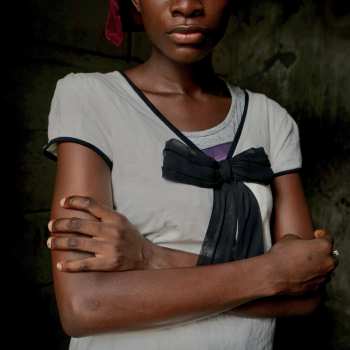Black Lives Matter – Our complicity in state violence in Cameroon
This blogpost originally appeared on the University of Oxford's Centre for Criminology blog. Read the original here.
Posted:
Time to read:
Martha Neba was four months old when she was killed by state soldiers during a raid of her family home in May 2019. Distressing footage shows a fatal bullet wound to Neba’s head.
Samuel Wazizi, a popular anglophone journalist and television reporter, was arrested and detained by the Cameroon forces in August 2019. Since then, Wazizi’s family and lawyers have been denied access to see him. On 6th June, the family made the devastating discovery that Wazizi had been killed in detention back in August.
Rural communities in anglophone Cameroon have also been harmed en masse. On 14th February 2020, a state-led armed militia inflicted violence on the people of Ngarbuh, a remote village in the forests of Cameroon. At least 21 civilians were recorded to have been killed, including 13 children and an unborn baby. Within two weeks of this trauma, another mass killing was reportedly committed by the Cameroon state in the village of Small Babanki. A fortnight ago, another spate state-sponsored killing reportedly occurred in the village of Mbocam. Last week’s massacre was in Ngarum. These crimes are only a small sample of hundreds that could be referenced.
Following the outbreak of conflict in Cameroon since 2016, thousands of minority anglophone Cameroonians have been killed by the majority francophone state. Although crimes have been committed by multiple parties, our latest research explains how the state is killing anglophone civilians at a disproportionate rate and effect than other actors. Relative silence from the international community seems to have emboldened the state to kill ever more civilians, with impunity, to date.
Multiple international actors are implicated in the crimes of the Cameroon state. Over the last 10 years, the US has funnelled hundreds of millions of dollars into Cameroon’s military forces and has long been involved in both arming and training the elite arm of the state security forces. In addition to these direct contributions by the US, in 2018 the UK government’s Department for International Trade announced a British partnership, which involved supporting a London-based oil and gas firm, New Age, to win the contract to develop an offshore floating natural gas project in anglophone Cameroon. New Age’s lucrative contract sees money going directly to the Societé Nationale des Hydrocarbures, which reportedly funds the elite armed forces of the state, involved in at least some of the aforementioned crimes.
The UK has a long record of assisting violence in Cameroon. In the seventeenth century, Britain inflicted severe harm on the peoples of Cameroon through the horrors of the trans-Atlantic slave trade; what we now know is that the anglophone regions were hit especially hard by this violent practice. Then, in the early twentieth century, Britain co-created the minority anglophone population by haphazardly separating the former German colony with the French colonial forces; each colonial power imposing a distinct set of state, legal, and cultural institutions which continue to divide the areas to this day. Many anglophone peoples felt further let down by the British state for perceived failure to support the Southern Cameroons plight for independence in 1960/61, which remains a core grievance fuelling the present conflict. Despite such deep and ongoing involvement in the Cameroon conflict, the UK Government continues to support oil interests in the region and has been woefully uncritical of state violence to date.
Black Lives Matter calls for an end to systemic state violence against disadvantaged black communities. Moreover, the protest movement brings into sharp focus the need for structural change in order to address inequalities created by centuries of slavery and colonial harm. Let us then extend this thought to the lives being lost at a concerning rate in Cameroon at the hands of the state. International actors collaborating with the Cameroon government are complicit in this violence. After hundreds of years of exploiting the peoples of Cameroon, it is time for the wrongs to be redressed.
Share:

